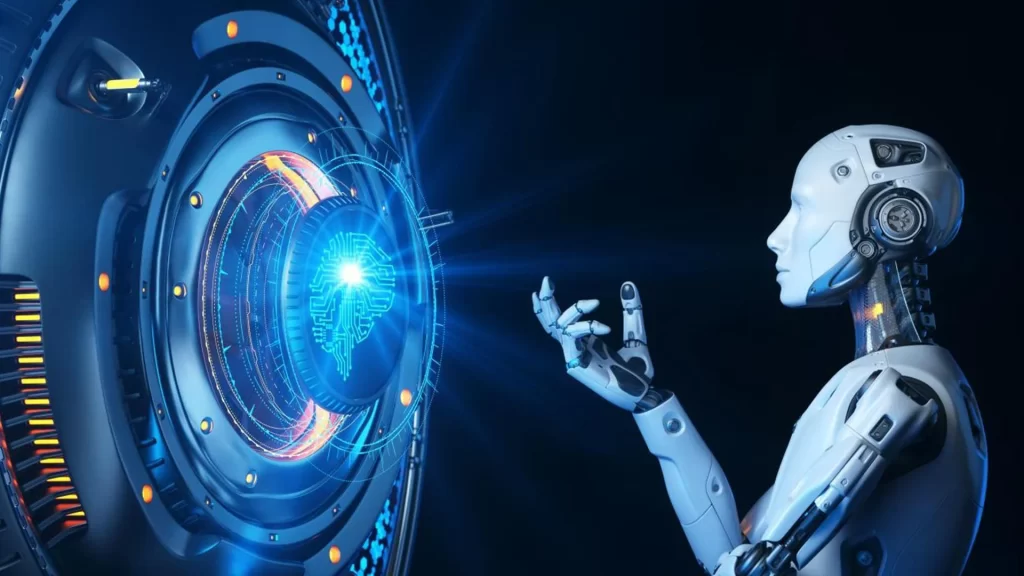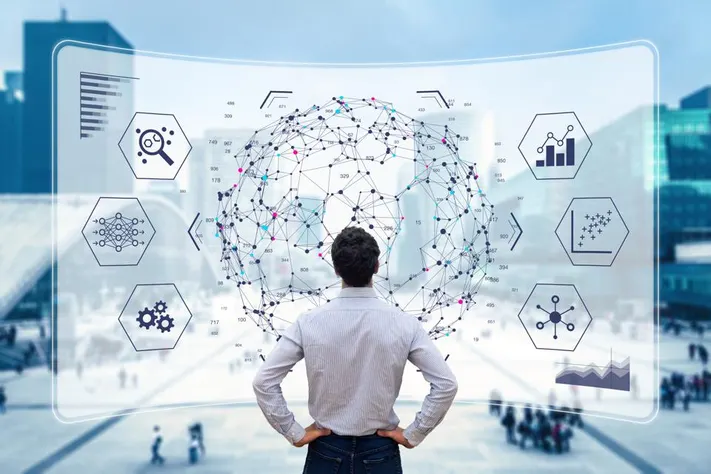Artificial Intelligence (AI) is no longer a concept confined to science fiction; it has become an integral part of our daily lives. The rapid advancements in AI technology are revolutionizing various aspects of our world, promising a future where AI seamlessly integrates into everyday activities, enhancing convenience, efficiency, and overall quality of life. In this article, we explore the multifaceted impact of AI on daily life and envision what the future holds.

AI in Healthcare: Transforming Medical Services
AI’s impact on healthcare is profound and ever-growing. The integration of AI in medical services is not only improving diagnostic accuracy but also transforming patient care. Advanced AI algorithms can analyze vast amounts of medical data swiftly, aiding in the early detection of diseases such as cancer and heart conditions. AI-driven tools, such as predictive analytics, enable personalized treatment plans, enhancing patient outcomes.
Robotic surgeries, powered by AI, are becoming more precise, reducing recovery times and minimizing complications. AI-powered virtual health assistants provide patients with 24/7 support, offering medical advice, appointment scheduling, and medication reminders. The future of AI in healthcare promises even more groundbreaking innovations, such as AI-driven drug discovery and advanced telemedicine capabilities, making healthcare more accessible and efficient.
Smart Homes: AI Enhancing Domestic Life
The concept of smart homes is rapidly evolving with AI at its core. AI-enabled devices and systems are transforming how we interact with our living spaces. From voice-activated assistants like Amazon’s Alexa and Google Assistant to smart thermostats and lighting systems, AI is making homes more intelligent and responsive.
AI algorithms learn from user behavior, optimizing energy consumption by adjusting lighting, heating, and cooling systems based on preferences and habits. Smart appliances, such as refrigerators and washing machines, can predict maintenance needs, order groceries, and even suggest recipes based on available ingredients. As AI technology continues to advance, we can expect even more sophisticated home automation systems that provide greater convenience, security, and energy efficiency.
AI in Transportation: Redefining Mobility
The transportation sector is undergoing a significant transformation with the integration of AI. Autonomous vehicles are at the forefront of this revolution, promising to redefine mobility. Self-driving cars, powered by AI, are equipped with advanced sensors and machine learning algorithms that enable them to navigate complex environments safely. These vehicles have the potential to reduce traffic accidents, lower emissions, and provide mobility solutions for those unable to drive.
AI is also enhancing public transportation systems. Predictive analytics help in optimizing routes, reducing waiting times, and improving overall efficiency. AI-powered traffic management systems can analyze real-time data to alleviate congestion and enhance the flow of traffic. The future of transportation with AI looks promising, with the potential for fully autonomous public transport systems and smarter, more connected cities.
AI in Education: Personalized Learning Experiences
AI is revolutionizing the education sector by offering personalized learning experiences tailored to individual needs. Adaptive learning platforms leverage AI to analyze students’ strengths and weaknesses, providing customized study plans and resources. This approach not only enhances learning outcomes but also keeps students engaged and motivated.
AI-powered tutoring systems offer on-demand assistance, helping students with difficult subjects and providing instant feedback. Educators benefit from AI as well, with tools that automate administrative tasks, analyze student performance, and suggest improvements to teaching strategies. As AI technology continues to advance, we can expect even more immersive and interactive learning experiences, such as virtual classrooms and AI-driven simulations.
AI in Entertainment: Transforming How We Consume Media
The entertainment industry is experiencing a paradigm shift with the integration of AI. Streaming services like Netflix and Spotify use AI algorithms to analyze user preferences and provide personalized content recommendations. This not only enhances user experience but also keeps them engaged with the platform.
AI is also transforming content creation. Algorithms can generate music, write scripts, and even create visual art. In the gaming industry, AI-driven characters and environments provide more immersive and dynamic experiences. As AI technology evolves, we can anticipate even more innovative applications, such as virtual reality experiences tailored to individual preferences and AI-generated interactive narratives.
AI in Finance: Enhancing Security and Efficiency
AI is making significant strides in the finance sector, enhancing both security and efficiency. Fraud detection systems powered by AI analyze transaction patterns in real-time, identifying suspicious activities and preventing fraud. AI-driven chatbots provide customers with instant assistance, handling inquiries, and performing transactions efficiently.
Robo-advisors, powered by AI, offer personalized investment advice based on individual financial goals and risk tolerance. These systems analyze vast amounts of market data, providing insights that help investors make informed decisions. As AI technology continues to advance, we can expect more sophisticated financial tools that offer even greater accuracy, security, and personalization.
AI in Retail: Revolutionizing the Shopping Experience
The retail industry is being transformed by AI, offering enhanced shopping experiences for consumers. AI-powered recommendation systems analyze customer behavior, suggesting products that match their preferences and purchasing history. This personalized approach not only boosts sales but also improves customer satisfaction.
AI-driven chatbots provide instant customer support, answering queries and assisting with purchases. In physical stores, AI-enabled systems manage inventory efficiently, ensuring that shelves are stocked with popular items. The future of retail with AI includes innovations such as virtual try-ons, where customers can see how clothes or accessories will look without physically trying them on, and more immersive shopping experiences through augmented reality.
AI in Workplace: Increasing Productivity and Innovation
AI is transforming the workplace by increasing productivity and fostering innovation. Automation of routine tasks allows employees to focus on more strategic and creative activities. AI-powered tools, such as project management software and virtual assistants, streamline workflows and enhance collaboration.
AI-driven analytics provide insights that help businesses make data-driven decisions, optimizing operations and improving performance. In the recruitment process, AI algorithms analyze resumes and identify the best candidates, reducing the time and effort involved in hiring. As AI technology continues to advance, we can expect even more innovative applications that enhance workplace efficiency and drive business growth.
The Ethical Considerations and Future Challenges
While the benefits of AI are immense, it is crucial to address the ethical considerations and challenges that come with it. Issues such as data privacy, bias in AI algorithms, and the potential for job displacement require careful consideration. It is essential to develop robust regulatory frameworks and ethical guidelines to ensure that AI is used responsibly and for the greater good.
The future of AI holds great promise, but it also necessitates a collaborative effort from governments, industry leaders, and society to address these challenges. By fostering a culture of transparency, accountability, and inclusivity, we can harness the power of AI to create a better future for all.
Conclusion
The future of artificial intelligence in everyday life is incredibly promising. From healthcare and education to transportation and entertainment, AI is set to revolutionize every aspect of our lives. By embracing these advancements and addressing the associated challenges, we can ensure that AI serves as a force for good, enhancing the quality of life for people around the world.


